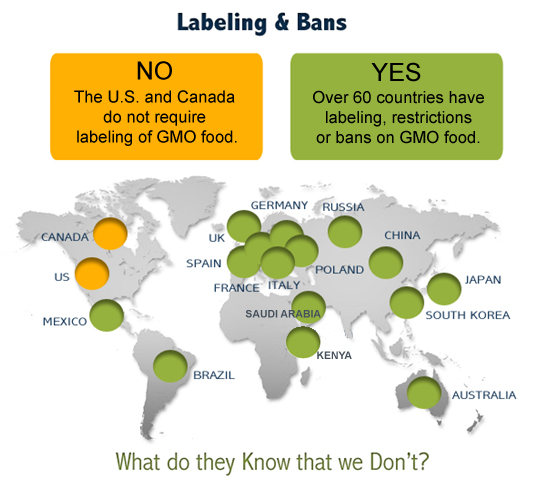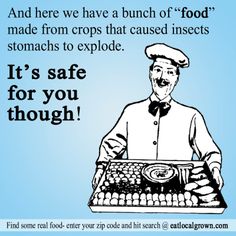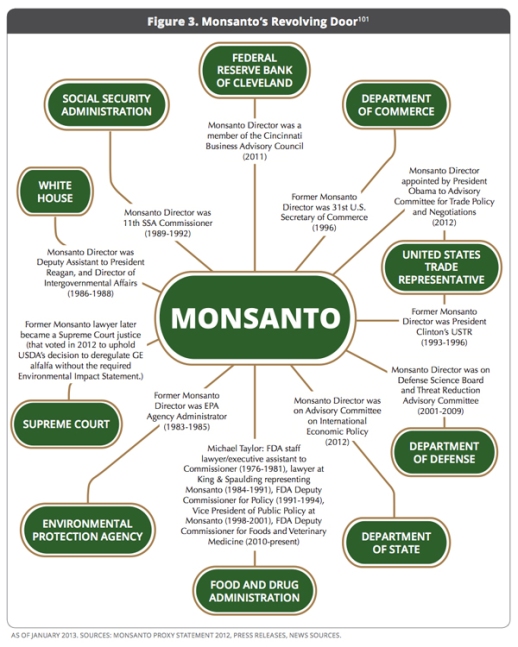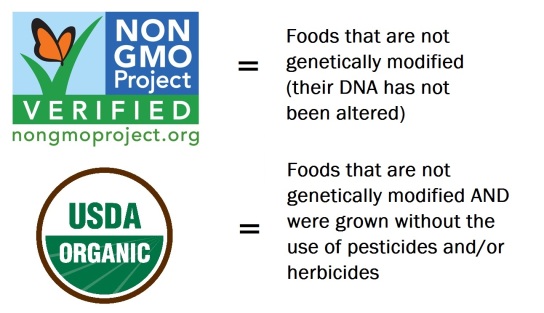GMO stands for genetically modified organism. To simplify this complicated biotechnological science, I will briefly discuss four conflicts associated with these food sources. GMO’s are engineered as:
-
seeds with genetic coding capable of defending themselves from insects
-
crops resistant to herbicides
.
CONFLICT #1
One of the major claims for development was the need to create greater crop yields to “feed the world” in the future. One of the most recent studies put out by the National Academies of Sciences-Engineering-Medicine claimed, “we could find no evidence from USDA [U.S. Department of Agriculture] data that genetic engineering has increased the rate at which U.S. crop yields are increasing.”
CONFLICT #2
The National Academies of Sciences-Engineering-Medicine defines itself as, “the nation’s preeminent source of high-quality, objective advice on science, engineering, and health matters.” Conflict #2 relates to the fact that this organization receives millions of dollars of funding from Big Business including Monsanto and DuPont (two organizations with monetary interests in genetic biotechnology.) These companies have also been given board positions overseeing the studies. In addition, the authors of many of these research publications have financial ties directly with the biotechnology industry.
CONFLICT #3
The FDA’s (Food and Drug Administation) authority to mandate (on a federal level) the labeling of food ingredients is based solely on a “danger to the public” criteria. Since the studies they base their decisions on have not produced this “standard,” they do not have the authority to mandate that food manufacturers place the GMO ingredients on the labels. The states, however, do have the right through legislative authority to mandate the labeling of GMO ingredients. If for no other reason than TRANSPARENCY, why would the states legislators propose legislation mandating the REMOVAL OF THE WORDS GMO FROM ALL PRODUCTS? If these products are safe as reported by our government, regulatory agencies and “researchers” why is there such concern to create a cloak of non disclosure about GMO ingredients?
 CONFLICT #4
CONFLICT #4
If GMO’s added “value” to farmers and consumers of these products why have 30+ countries banned them altogether? The list includes:
Algeria (since 2000), Madagascar (since 2002), Turkey, Kyrgyzstan, Bhutan, Saudi Arabia, Belize, Peru, Ecuador, Venezuela, Scotland, Wales, Northern Ireland, Germany, France, The Netherlands, Malta, Cyprus, Greece, Bulgaria, Russia, Serbia, Croatia, Italy, Denmark, Hungary, Moldova, Latvia, Lithuania, Austria, Poland, Slovenia, Azerbaijan, Bosnia and Herzegovina, Luxembourg, Ukraine, Norway, Switzerland
Without going into the details of the possible dangers and ethical conflict of this FOOD technology , one must ask, “does it make sense to consume a product with so much controversy?” “How many times have we been assured of the safety of products and chemicals only to learn decades later our science “unfortunately was inaccurate?”
The best way to AVOID GMO is by purchasing NON GMO and ORGANIC FOODS. Yes, this means your food budget will increase in times where budgetary constraints may already be bursting at the seams. If you value your health and wish to exclude yourself from this giant human laboratory experiment, I encourage you to consider avoiding purchasing GMO foods.
LOOK FOR THESE LABELS ON THE FOODS YOU PURCHASE
FOR EVERYONE’S INFORMATION:
The following is a list of the 8 Most Common GMO Crops:
-
Alfalfa (first planting 2011)
-
Canola (approx. 90% of U.S. crop)
-
Corn (approx. 88% of U.S. crop in 2011)
-
Cotton (approx. 90% of U.S. crop in 2011)
-
Papaya (most of Hawaiian crop; approximately 988 acres)
-
Soy (approx. 94% of U.S. crop in 2011)
-
Sugar Beets (approx. 95% of U.S. crop in 2010)
-
Zucchini and Yellow Summer Squash (approx. 5,000 acres)








Thank for the tip 8 list and ingredient list. It’s amazing how vigilant we need to be when we allow others, who we assume know best, to make decisions.
LikeLiked by 1 person
I think we have become complacent and willing to let others make decisions affecting our lives. I believe some large businesses are well aware of this and willing to take advantage of our apathetic attitudes. The GMO story is deceptive in purpose and research. “Feeding the world” appears altruistic, yet many starving counntries are unwilling to accept GMO imports and have made it illegal to produce GMO crops. There is a truth not being revealed and for this reason alone, each of us must make a personal decision whether we wish to participate in this “human experiment.”
LikeLike
So many disturbing things in this post. How can organizations oversee a study that will adect their bottom line? Thnka you for the list of 8 items. My question to you is this: We usually use extra virgin olive oil. I am always reading use canola oil instead corn and vegetable oil. Is canola not the healthier choice?
LikeLiked by 1 person
Canola oil used to considered a better oil. The processing of this oil and the fact that such a large percentage of it is genetically modified today takes this oil OFF any of my recommended lists. My three favorite oils for nutrient value and taste are Avocado Oil, Olive Oil and Coconut Oil. Avocado oil can be used at higher heating temperatures without damaging its nutritional value. Olive oil is a great source of mono saturated fat- a great cardiovascular protector. Coconut oil is a GOOD saturated fat based on its chemical composition (medium chain triglycerides) and helps prevent arterial blockages.
LikeLiked by 1 person
Thank you for these tips. We rarely fry anything. When my wife does use oil, she has shifted to using olive oil. I just read your comments to here and she says she has eaten foods cooked with coconut oil in the Dominican Republic and she loved it. Our next shopping trip will include coconut oil on our list. Thanks for the suggestion.
LikeLiked by 1 person
So true, but without true awareness, we are unable to make informed choices and many of us look to our medical practitioners for the truth in every aspect of health care.
I still havent watched the entire film yet (https://g.co/kgs/900r2h) available on Netflix etc
I did, however, watch this interview about the making of this film…unfortunately, your post here is so very tragically real.
Keep raising awareness…it is worth every single soul you reach out there. Knowledge is power. We all deserve to understand our choices fully.
Passionate cause…why else would anyone become a doctor, other than to uphold their Hippocratic oath; “the utmost respect for human life from its beginning” “do no harm”.
If they truly strive to preserve life with everything they have available to them to heal others then I do not understand this. This includes the pharmaceutical drug risks/ issues and their related health risks. Clearly, not all are so honourable and caring. Thankfully, there are a great many that are stepping forward and speaking out ❤
LikeLiked by 1 person
Thank you for all the information you included in your comment. I’m certain those following my blog site will value greatly from watching these videos.
Creating awareness is a two edge sword. Unwanted, yet truthful information creates emotional hostility against the educator as well as the subject. I have heard many people respond by suggesting I allow “sleeping dogs to lie.” Unfortunately, my ethics and morals make that an unrealistic option.
My goal is NOT to tell people what to do. My goal is to provide information to help people make better informed decisions for themselves. We live in a wonderful world with great opportunities, but we must also realize that great opportunities create undesirable deceptions as well. I do not suggest we walk this earth assuming the worst until proven otherwise. Instead I suggest we sharpen all our senses to detect when something in life doesn’t “quite seem right.” Challenge ideas until they become valid AND make sense. Don’t just assume truth is spoken because it comes from the mouth of a person in “authority” with credentials.
LikeLiked by 1 person
Absolutely 😊
LikeLiked by 1 person
Sorry the link for the interview of the documentary I referred to didn’t seem to attach…
LikeLike
It still is not showing up from what I can see…it’s on youtube TheLip Tv channel if interested.
LikeLiked by 1 person
On my site, the you tube video IS showing up
LikeLiked by 1 person
Ok. It’s missing from the feed that I can see. (Movie link id there..not the interview) All good. 😊
LikeLiked by 1 person
One thing those of us concerned by this can do is support heirloom seed collections and distribution. I love Seed Savers, located in Decorah, Iowa. Their Heritage Farm is worth a visit.
http://www.seedsavers.org/mission
“Seed Savers Exchange takes threats to biodiversity seriously. We maintain a collection of more than 20,000 heirloom and open-pollinated vegetable, herb, and plant varieties, including over 1,000 varieties of heritage apple trees. We take great care to ensure the health and viability of our collection for generations of growers to come. We keep the bulk of our collection in an underground freezer vault at Heritage Farm.
Each year, we grow out select varieties in gardens at Heritage Farm to refresh our seed supply. To maintain accurate records of each variety’s traits, our Evaluation Team grows out other varieties and keeps careful track of them, updating descriptions, and checking for inconsistencies. Our seed historian researches the story of each variety, documenting its history and the lives of the people who brought it to our collection.”
Of course, GMO’s pose a potential threat to heritage crops. Real biodiversity has the potential to solve a lot of the problems that the GMO’s are trying to fix. I would love to see more effort put in that direction.
Wonderful post!
LikeLiked by 1 person
Thank you for adding this comment. This is the type of interaction I believe will benefit all readers. I hope people will take a minute and review the link you added. This is a VERY worthwhile mission. Thank you so much for taking the time to share the story about Seed Savers.
LikeLiked by 1 person
My pleasure! This company is close to my heart.
LikeLike
I am concerned about GMO foods, but I think my family thinks I’m overly so. 😦
LikeLiked by 1 person
I think your family will benefit greatly if they follow your concerns. They might think twice about eating foods with bacteria and viruses DNA spliced into them.
LikeLike
It’s frustrating for me sometimes. They think I’m nutty, or ill-informed. I wish I had a pamphlet I could hand to them to read, one that was 4-6 pages long and explained the dangers in layman’s terms. When you write that pamphlet, let me know, okay? I’ll take 10 copies, please!
LikeLiked by 1 person
This is simply a recurring theme. Show them the you tube videos of ddt being sprayed directly on children in the 1950’s because the government said, “it protected children.” Show them the cigarette advertisements where doctors supported smoking as a “healthful” activity promoting better lung function. Maybe they will begin to recognize GMO’s as the latest controversial claim as a “safe” food.
LikeLiked by 1 person
Wow shocking the things we do not know!
LikeLiked by 1 person
It’s all about creating awareness to give people the choice to direct their own lives.
LikeLiked by 1 person
Yes so true and important
LikeLiked by 1 person
Oh hell, zuchini is on the list. Its the one vegetable we eat relentlessly.
LikeLiked by 1 person
Seek out organic zuchini and you can enjoy as many as you’ d like 🙂
LikeLiked by 1 person
I am on the hunt!
LikeLiked by 1 person
LikeLike
Funny, I just heard on the local news down here, of course they were reading a copy from some editors desk, but I can’t remember exactly how they said it, but GMO’s are probably safe for human consumption……I just laughed…how crazy do they think we all are….sheep follow the pack leader….LOL I often wonder if all the wonderful fresh produce we but at the local stand is GMO…however the corn I bought actually had a couple with big fat worms….ant they are not perfect shape…guess that would mean they are not using pesticides…??? I would hope….another great informational post and I have watched the videos….scary….when we were traveling around the US, there would be huge signs on crops stating the were Monsanto Farms….very proud of being responsible for GMO crops…..amazing !! xxkat
LikeLiked by 1 person
I don’t know if you remember in the 1950’s when DDT was sprayed directly on children in swimming pools at at schools. That too was promoted as healthy and safe. GMO’s are simply the latest in the recurring cycle of potential misinformation. A bigger question is why subject yourself to food that had bacteria and virus DNA genetically encoded into its manufacturing when you can eat food without any chemical alteration or pesticide exposure? COST? It costs much more to pay for treatment resulting from poor lifestyle choices than it costs to feed oneself quality nutrition.
LikeLike
Very true, we asked the man who owns the stand and he sweats all his food is pesticide free…no organic signs up, but its a shack on the side of the road…sounds bad but we were happy to find the works in the couple ears of corn….and they were small and looked more natural than the GMA crap…and I always scrub all my vg and fruit organic or not….I understand the non organic could be or not GMO…wish they had to post it …..
LikeLiked by 1 person
Lobbying organizations are pressuring state congressman and women to do all they can to make certain the consumer remains in the “DARK” whether products contain GMO or not. Can you imagine anyone keeping a straight face while making the argument that people are better off not knowing the sources of food they consume?
LikeLike
Its all about greed….as I aged the bottom line was always the same….no matter, its about the all mighty dollar!!!
LikeLiked by 1 person
This explains so much. It explains why north American have so many health problems and why we need to try so hard to eat healthy. The entire system that is meant to help us is working against us. All you need to add to this mix is no exercise and a 8 hour a day desk job. This is the reality of so many people including myself. This is sad.
LikeLiked by 1 person
Awareness is the first step necessary for change. Hopefully my efforts help motivate others to question current policy decisions and stimulate additional thinking before we place food “substances” in our mouths.
LikeLike
Thanks for the wealth of information here. I always feel enlightened with your posts. I think to eat healthier, one is going to have to spend more….well certainly here in South Africa. Thanks again 🙂
LikeLiked by 1 person
It’s funny how we all think. When I think of increase spending on quality food, I think of decreased spending on disease care and treatment. The net bottom line is a cost SAVINGS by spending MORE on quality food.
LikeLiked by 1 person
You are so right !!! 🙂 We eat very healthily as a family, and I can honestly say…we never get sick, never get colds and flu, so it certainly pays off. 🙂
LikeLiked by 1 person
Thank you for commenting about the health of your family. When people read about other families living a lifestyle that promotes GOOD HEALTH, it adds reality to the articles I write about. Enjoy ALL the benefits resulting from your commitment to yourself and your family.
LikeLiked by 1 person
By itself, GMO technology would not push my buttons. But it is not by itself. It is entangled in a culture that is casual about conflicts of interest (as U so rightly point out) and unintended consequences. One of several conservation concerns about monarch butterflies is that herbicides sprayed liberally on GMO crops will drift to nearby milkweed plants and diminish the caterpillars’ food supplies. Hard to tell how serious this concern is, when the people who should be looking into it know little and care less.
LikeLiked by 1 person
The consumer recognizes the danger when a fox is assigned the task of guarding the hen house. Why are they so willing to blind themselves to the same concept with consequences that may affect their own lives? Awareness? Belief? Fatigued by the stresses of life?
This is a dangerous path to continue to blindly follow.
LikeLiked by 1 person
I grew up eating foods made using organic coconut oil. Later I was led to believe that canola oil is better for health, so used canola, coconut and extra virgin olive oil. I am so happy to read your post about GMOs in canola oil and reaffirm my faith in coconut and olive oil.I have not used avocado oil yet, but will try it for sure.
LikeLiked by 1 person
You will find no sacrifice giving up canola oil. Having these alternative healthier choices that add quality and flavor to food is a great benefit.
It’s interesting how different cultures are exposed to different cooking oils. I grew up with lard as a cooking fat. Organic coconut oil is a better choice.
LikeLiked by 1 person
Great minds think alike! I just posted about organic food.
The beef that we buy is grass-fed as much as possible, but when the snow starts, they have to use feed. However, I interrogated the family who sells it to me and they have assured me they are a GMO-free farm. It is definitely pricey, but so is being sick!
LikeLiked by 1 person
If eating healthy AND being sick is expensive, why not choose the one that doesn’t add the additional complications including (1) lost time from work, (2) feeling horrible and (3) inability to handle daily living responsibilities. You are following a path in life that will likely lead you where you want to be. Thumbs up AND a HIGH FIVE!
LikeLiked by 1 person
I’m also writing to let you know what a incredible experience my wife’s princess gained using your site. She picked up lots of things, most notably how it is like to possess an incredible teaching style to let folks very easily have an understanding of several tricky topics. You actually exceeded our desires. I appreciate you for delivering the insightful, trusted, informative and fun guidance on that topic to Sandra.
LikeLike
say thanks to so much for your site it aids a lot.|
LikeLike
This is the right blog for anyone who wants to find out about this topic. You realize so much its almost hard to argue with you (not that I actually would want…HaHa). You definitely put a new spin on a topic thats been written about for years. Great stuff, just great!
LikeLike